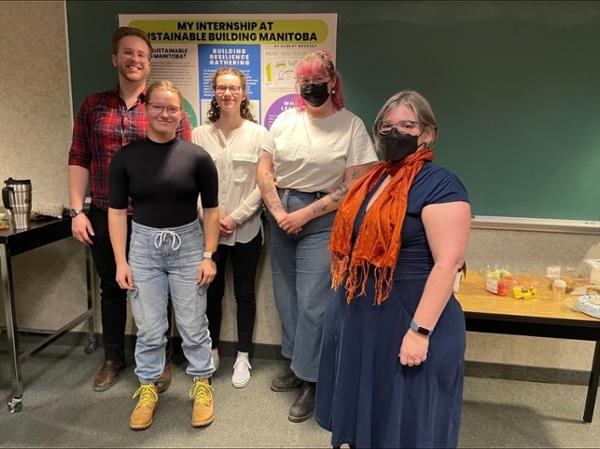Geography Internship Colloquium

Students taking part in a new Geography & Environmental Studies and Sciences Internship course used hands-on learning to explore different forms of advocacy within local organizations. At the end of their 30-hour placements, these students gathered to share their experiences.
The experimental for-credit course was designed and implemented by Dr. Patricia Fitzpatrick, who aimed to have students apply their academic knowledge within sustainability-focused organizations in Winnipeg. Student internships were hosted by the Lake Winnipeg Foundation, Green Action Centre, Prairie Climate Centre and Duck Mountain Provincial Park, among others.
Projects involved lab work, data collection and analysis, conference planning, research, writing and editing, the purpose of which was largely to spread awareness of sustainability initiatives that involved public citizens. One intern placed with the Lake Winnipeg Foundation’s community-based monitoring network remarked that she really “felt like a scientist” doing hands-on work in a lab with state-of-the-art equipment, and that the experience also provided a behind the scenes look at how research is conducted in a professional setting.
More surprisingly, some interns also undertook aspects of visual communications in their projects, from designing infographics and crafting eye-catching social media posts, to designing an interactive story map for an upcoming environmental campaign. One student who worked on a public letter-writing campaign for Green Action Centre talked about his newfound interest in “visual artwork construction and application” from a communications standpoint, as he learned to use Canva to design graphics. Another student was excited to “apply geography to environmental studies” by learning how to design an interactive story map for Duck Mountain Provincial Park. She similarly noted her enjoyment of the visual aspect of this project, which involved overlaying geographic data onto an online map for “a different kind of knowledge mobilization.”
Students were also especially appreciative of community mentors from organizations, who were friendly and welcoming. On more than one occasion, students mentioned how they discovered that networking in these work environments didn’t have to be formal or intimidating. “It was literally just talking to people to find out what they were up to” one student remarked, noting the importance of curiosity in establishing a rapport with colleagues. She also noted that asking questions led her to more information that reinforced her past classroom-based learning as well as her current hands-on experience.
The project was funded by a University of Winnipeg Experiential Learning Grant, which allowed for students, as well as host organizations, to receive some compensation for their hours outside the classroom. Student-interns were also appreciative of the honorarium that the funding afforded, and multiple students candidly mentioned that an internship like this wouldn’t have been a financial reality for them otherwise. In a couple of cases, students also received a paid contract to complete project work that extended past the internship’s allotted hours for course credit.
Dr. Fitzpatrick likewise expresses gratitude for the funding provided. “Students often have to juggle school, work and home commitments. Providing course credit, as well as an honorarium to recognize their contributions, ensures that more are able to access professional work environments in their chosen field.”
